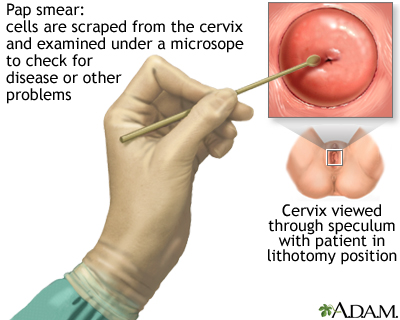For many Nigerians, the word “pap” immediately brings to mind a semi-solid food made out of milled corn. However medically, there is a test known as the Pap test or pap smear which is done to detect presence of precancerous or cancerous cells on the cervix. This test is not named after the food we are familiar with in these parts, It’s named after the doctor who determined that this was a useful way to detect signs of cervical cancer, Georgios Papanikolaou.
 Who should get a Pap smear?
Who should get a Pap smear?
Generally, you should start getting regular Pap test to check for cervical cancer every 3 years if you are 21 or older. If you are age 30-65, you can get both a Pap test and HPV test every 5 years. Older than that, you may be able to stop testing if your doctor says you’re low risk.
You should still get regular Pap smears even if you’re in a monogamous relationship. That’s because the HPV virus can be dormant for years, and then suddenly become active.
Preparation for a Pap Smear
You can schedule a Pap smear with your annual gynecological examination (that is assuming you do get an annual check-up) or request a separate appointment with your gynecologist. Here in Nigeria you can also walk into a good diagnostic centre even without a referral and request for one.
If you’ll be menstruating on the day of your Pap smear, your doctor may want to reschedule the test, since results could be less accurate. Try to avoid having sexual intercourse, douching, or using spermicidal products the day before your test because these may interfere with your results.
Since Pap smears go more smoothly if your body is relaxed, it’s important to stay calm and take deep breaths during the procedure.
So why is it important to get a Pap test done?
The human papillomavirus (HPV) is a virus that causes warts. There are over 100 different types of HPV. There are 40 that are sexually transmitted. The primary causes of cervical cancer are HPV types 16 and 18. Even though a Pap smear doesn’t test for HPV, it identifies cellular changes caused by the virus. By detecting cervical cancer cells early with a Pap smear, treatment can start before it spreads and becomes a bigger problem.
You can get HPV from sex with men or women. All sexually active women are at risk for contracting HPV and should get a Pap smear at least every three years.

About the procedure.
So there’s good news and bad news.
The bad news is that pap smears can be a bit uncomfortable and maybe even painful for some women. The good news however is that it is usually very quick.
During the procedure, you’ll lie on your back on an examination table with your legs spread and your feet resting in supports called stirrups. Your doctor will slowly insert a device called a speculum into your vagina to keep the vaginal walls open and provide access to the cervix. Then your doctor will scrape a small sample of cells from your cervix using a tool called a spatula or brush. Most women feel a slight push and irritation during the brief scraping.
The sample of cells from your cervix will be preserved and sent to a lab to be tested for the presence of abnormal cells.
After the test, you might feel mild discomfort from the scraping, or a bit of cramping. You could also experience very light vaginal bleeding immediately following the test. Tell your doctor if discomfort or bleeding continues after the day of the test.
Results of a Pap Smear
There are two possible results from a Pap smear: normal or abnormal. If your results are normal, you probably won’t need a Pap smear for another three years.
If the test results are abnormal, this doesn’t mean you have cancer. It simply means that there are abnormal cells on your cervix, some of which could be precancerous. Depending on what the test results show, your doctor may recommend increasing the frequency of your Pap smears, or getting a closer look at your cervical tissue with a procedure called colposcopy. This exam uses light and magnification to see vaginal and cervical tissues more clearly. In some cases, your doctor may also take a sample of your cervical tissue in a biopsy to have a better look.
Pap tests are very accurate and regular Pap screenings reduce cervical cancer rates and mortality by 80 percent. Like a lot of medical testing, it’s not fun, but the short term discomfort isn’t a good reason to neglect your well-being. Getting regular Pap smears is the best way to detect any abnormalities or precancerous changes and protect your health.






